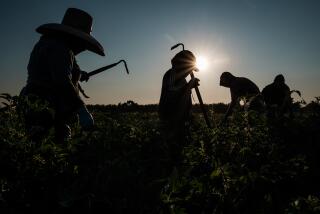U.S. Judge Says UFW Can’t Define Members’ Standing
- Share via
SAN DIEGO — In what could be a victory for the conservative right-to-work movement, a federal judge on Thursday ruled unconstitutional a state labor law giving the United Farm Workers of America the right to define the “good standing” of its members. Under California’s Agricultural Labor Relations Act, a union can ask a company to fire a worker if the employee is not in “good standing” with the union. The definition of good standing is determined by the union.
U.S. District Judge J. Lawrence Irving in San Diego ruled that the UFW violated the First Amendment rights of six UFW members who were fired from their jobs and suspended by the union after they crossed a UFW picket line in 1979. The First Amendment guarrantees the right to free speech and association.
“Mere union strength and industrial peace are insufficient goals to justify abridgement of rights which union members hold,” Irving wrote in a 20-page decision. Although he declared the clause unconstitutional, Irving did not take any action that will change the law before the expected appeals process begins.
If the decision is upheld, California workers will fall under national labor law, which gives unions the power to deny good standing only when a union member has failed to pay his dues.
The national law exempts agricultural workers but gave the states the right to establish broader regulations. California’s farm labor laws are among the most liberal in the nation, and unions have expanded powers to judge the “good standing” of members beyond the question of dues.
“This is a major victory,” said Robert Gore, staff attorney with the National Right to Work Defense Foundation in Washington. California agricultural workers, most of whom are Mexican-American and Hispanic, now have “the same rights as other workers in the country,” he said.
Union officials said they would immediately appeal the decision.
“On the surface it appears to be a victory (for the other side),” said Dianna Lyons, chief appellate counsel for the UFW. But since the case began in 1980, she said, the union has been using the paid-dues criteria as the “only basis” for firing UFW members.
The case evolved from the UFW’s strike against farms owned by Sun Harvest in both Imperial Valley and the Salinas Valley. The six plaintiffs, who initially supported the strike, crossed UFW picket lines about two months after the strike began.
One Worker Killed
The labor dispute was bitter--one farm worker was killed, several workers and law officers were injured and dozens of union members were arrested.
After the strike was settled, UFW officials asked Sun Harvest to fire the workers who crossed the picket line, which the company did. Six of them, led by Guadalupe Beltran, then proceeded through what Irving described Wednesday as a “procedural nightmare” that included unsuccessful legal action against the union and the Agricultural Labor Relations Board in California superior and appellate courts.
In May, 1984, the workers--five of whom were subsequently rehired--filed a federal lawsuit against the UFW, the ALRB and several state officials. The suit seeks $500,000 in punitive damages and $50,000 in compensatory damages.
“We were very surprised” by the decision, said Nancy Smith, ALRB staff attorney in Sacramento, adding that the state court had “already upheld” the good-standing clause.
Because Irving ruled only on the constitutionality of the good-standing clause and did not issue an injunction, the UFW could under the law still dismiss a worker for reasons other than non-payment of dues.
The appeal process, both sides acknowledged, could take months or years and will likely end up in the U.S. Supreme Court.
More to Read
Sign up for Essential California
The most important California stories and recommendations in your inbox every morning.
You may occasionally receive promotional content from the Los Angeles Times.










